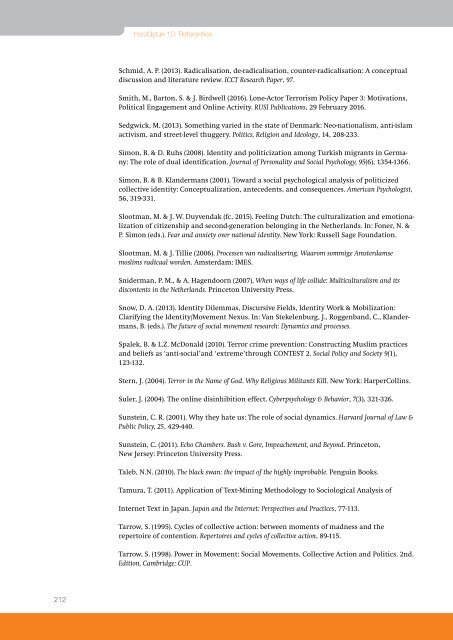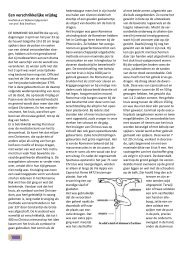2606-volledige-tekst_tcm28-124504
2606-volledige-tekst_tcm28-124504
2606-volledige-tekst_tcm28-124504
Create successful ePaper yourself
Turn your PDF publications into a flip-book with our unique Google optimized e-Paper software.
Hoofdstuk 10: Referenties<br />
Schmid, A. P. (2013). Radicalisation, de-radicalisation, counter-radicalisation: A conceptual<br />
discussion and literature review. ICCT Research Paper, 97.<br />
Smith, M., Barton, S. & J. Birdwell (2016). Lone-Actor Terrorism Policy Paper 3: Motivations,<br />
Political Engagement and Online Activity. RUSI Publications, 29 February 2016.<br />
Sedgwick, M. (2013). Something varied in the state of Denmark: Neo-nationalism, anti-islam<br />
activism, and street-level thuggery. Politics, Religion and Ideology, 14, 208-233.<br />
Simon, B. & D. Ruhs (2008). Identity and politicization among Turkish migrants in Germany:<br />
The role of dual identification. Journal of Personality and Social Psychology, 95(6), 1354-1366.<br />
Simon, B. & B. Klandermans (2001). Toward a social psychological analysis of politicized<br />
collective identity: Conceptualization, antecedents, and consequences. American Psychologist,<br />
56, 319-331.<br />
Slootman, M. & J. W. Duyvendak (fc, 2015). Feeling Dutch: The culturalization and emotionalization<br />
of citizenship and second-generation belonging in the Netherlands. In: Foner, N. &<br />
P. Simon (eds.). Fear and anxiety over national identity. New York: Russell Sage Foundation.<br />
Slootman, M. & J. Tillie (2006). Processen van radicalisering. Waarom sommige Amsterdamse<br />
moslims radicaal worden. Amsterdam: IMES.<br />
Sniderman, P. M., & A. Hagendoorn (2007). When ways of life collide: Multiculturalism and its<br />
discontents in the Netherlands. Princeton University Press.<br />
Snow, D. A. (2013). Identity Dilemmas, Discursive Fields, Identity Work & Mobilization:<br />
Clarifying the Identity/Movement Nexus. In: Van Stekelenburg, J., Roggenband, C., Klandermans,<br />
B. (eds.). The future of social movement research: Dynamics and processes.<br />
Spalek, B. & L.Z. McDonald (2010). Terror crime prevention: Constructing Muslim practices<br />
and beliefs as ‘anti-social’and ‘extreme’through CONTEST 2. Social Policy and Society 9(1),<br />
123-132.<br />
Stern, J. (2004). Terror in the Name of God. Why Religious Militants Kill. New York: HarperCollins.<br />
Suler, J. (2004). The online disinhibition effect. Cyberpsychology & Behavior, 7(3), 321-326.<br />
Sunstein, C. R. (2001). Why they hate us: The role of social dynamics. Harvard Journal of Law &<br />
Public Policy, 25, 429-440.<br />
Sunstein, C. (2011). Echo Chambers. Bush v. Gore, Impeachement, and Beyond. Princeton,<br />
New Jersey: Princeton University Press.<br />
Taleb, N.N. (2010). The black swan: the impact of the highly improbable. Penguin Books.<br />
Tamura, T. (2011). Application of Text-Mining Methodology to Sociological Analysis of<br />
Internet Text in Japan. Japan and the Internet: Perspectives and Practices, 77-113.<br />
Tarrow, S. (1995). Cycles of collective action: between moments of madness and the<br />
repertoire of contention. Repertoires and cycles of collective action, 89-115.<br />
Tarrow, S. (1998). Power in Movement: Social Movements, Collective Action and Politics. 2nd.<br />
Edition, Cambridge: CUP.<br />
212




